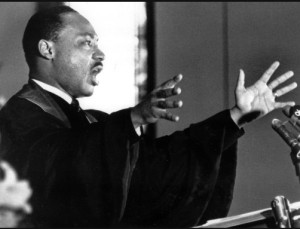This is part of a quote from Dr. Martin Luther King, April 18th, 1959:
“Whatever career you may choose for yourself—doctor, lawyer, teacher—let me propose an avocation to be pursued along with it. Become a dedicated fighter for civil rights. Make it a central part of your life. It will make you a better doctor, a better lawyer, a better teacher.”
Before he became one of the most respected civil rights leaders in American history, Martin Luther King Jr. served as pastor of the Dexter Avenue Baptist Church (now Dexter Avenue King Memorial Baptist Church) from 1954 to 1960. During that time, on the night of January 27, 1956, when he was just 27 years old, he received a death threat. The caller told him if he didn’t leave Montgomery in three days, his house would be blown up and he would be killed. That phone call changed his life forever. As we know, Dr. King did not leave Montgomery. Instead, he followed the higher call to face his fear and seek justice.
Was Martin Luther King a minister first, or a civil rights leader first? I believe he was both. Civil rights activism was his ministry, both his vocation and his avocation.
But for the majority of us, being a “dedicated fighter for civil rights” as a vocation is not feasible. I started my professional career as a minister. After only eight years I decided, with help from a career counselor, that ministry wasn’t my calling after all. So I went to work for an HMO and eventually became a health care project manager.
I feel a sense of mission, commitment, and conviction to my profession as a project manager as strong as I ever did as a minister, especially at Dana-Farber. But I’ve been finding it pretty difficult to concentrate on my work lately. In the past few weeks leading up to today (January 20, 2017), my comfortable existence has been threatened in a way I never thought possible.
Well, maybe once or twice I thought it possible. When I was in high school, I boycotted lettuce during the Salad Bowl Strike, in solidarity with Cesar Chavez on behalf of United Farm Workers. And in 1985 I participated in a march on the 40th anniversary of the atomic bombings of Hiroshima and Nagasaki.
Besides that, I’ve been a “sleepy” activist. Until now. It seems like somebody shook up my snow globe world and it didn’t just snow—everything came loose and I’m tumbling head over heels. I’m active on Twitter and Facebook. I belong to the Action Together Network. I march. I call senators and representatives with my concerns about the Affordable Care Act. And I do these things on my own time.
Lately I’ve even asked myself: Did I make a mistake by abandoning my original vocation? But Dr. King’s words have helped me answer that question. Dr. King tells me if I keep doing what I’m doing, I will be a better project manager. And what better place to be a good project manager than at Dana-Farber? It is indeed a high calling.


After 16 years living in the U.S I never stop learning from MLK. Thank you for sharing his words of wisdom.
I see more and more social responsibility being included in our education system. Babson College makes sure to have their professors include social responsibility as a topic on their courses. I think we all have a responsibility to make society better. We all want a fair society for everyone.
Thank you for your activism.
Thank you Vanessa. I’m glad to hear that social responsibility is becoming an integrated part of a college education these days–at least at places like Babson.
Hi Sandie – your post really spoke to me and is a reminder that it’s not just what we do for work, but how we live and manifest our values and beliefs in our whole lives – including in our work lives – that is what’s most important.
Thank you for your wonderful message.
Cindy McKeown
Hi Sandie – your post really spoke to me and is a reminder that it’s not just what we do for work, but how we live and manifest our values and beliefs in our whole lives – including in our work lives – that is what’s most important.
Thank you for your wonderful message.